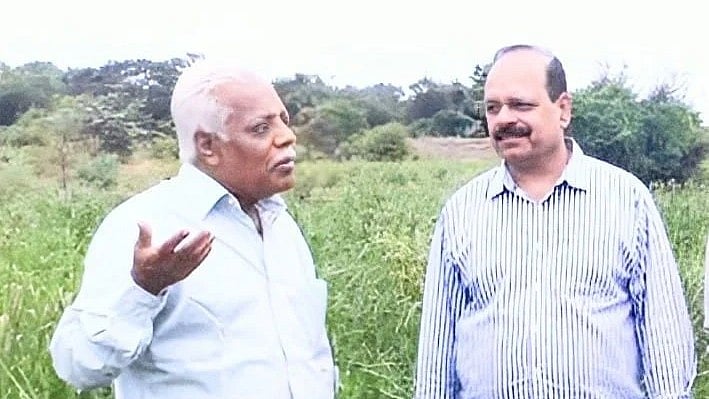
In the late 1970s, Dr Annadana Seetharam took a bold step in championing the sunflower, a crop then virtually unknown to Indian agriculture. At the University of Agricultural Sciences, Bengaluru, when many saw sunflowers as a novelty, he confidently declared, “mark my words, sunflowers will soon bloom across the Deccan Plateau.”
Dr Seetharam passed away on June 2, 2025, at the age of 81. He leaves behind a legacy as the father of sunflower hybrid breeding in India and a leading force in the revival of small millets. True to his name, ‘Annadaana’ (the one who bestows food) his life’s mission was to empower India’s farmers through science, dignity, and self-reliance.
Through relentless field trials and farmer outreach, he led the development of BSH 1 and KBSH 1, the first public-sector sunflower hybrids released in the 1980s. These hybrids transformed productivity, raising yields from 500 to 600 kg per hectare in open-pollinated varieties to 1,000 to 1,500 kg per hectare, under rainfed conditions.
This breakthrough made sunflowers a profitable option for dryland farmers across Karnataka, Andhra Pradesh, Maharashtra and Tamil Nadu. Acreage expanded from 70,000 hectares in the 1970s to over 2.5 million hectares by the late 1990s.
By the mid-1990s, sunflower oil accounted for nearly 15% of India’s edible oil pool. The success of these hybrids not only helped reduce import dependency but also offered health-conscious consumers a heart-friendly oil alternative.
Working closely with the ‘Technology Mission on Oilseeds’, Dr Seetharam advocated fiercely for sunflowers’ place in national policy. When met with bureaucratic skepticism, he famously quipped, “If you can trust palm trees for oil, surely you can trust the sun!”
But science was never separate from the soil for him. At farmer meetings, he engaged with humility and humour. When a villager once asked, “Is this just a flower, or will it actually yield oil?” he replied with a chuckle.“First a flower, then food for the family!” he exclaimed.
Whether in the dusty fields of Bidar or Bellari, notepad in hand, inspecting the seed set, he remained a field person at heart. Once, when a junior scientist requested to skip a scorching field visit, he grinned, “Sunflowers do not take a break from the sun, why should we?”
Born in 1944 in Harohalli, Karnataka, into a family steeped in the tradition of food donation, Dr Seetharam combined brilliance with purpose.
After earning his PhD in Cytogenetics from the Indian Agricultural Research Institute, New Delhi, under the mentorship of stalwarts like Dr M S Swaminathan, he began a journey that would redefine India’s oilseed and millet landscapes.
Millet revival
He was also a passionate champion of millets like ragi, foxtail millet and barnyard millet. As National Coordinator of the All India Coordinated Small Millets Improvement Project, he led the release of over 50 improved varieties and curated a gene bank of 11,000 accessions, later recognised as a National Active Genetic Resources Site at Bengaluru by the Indian Council of Agricultural Research. His work empowered tribal and dryland communities with resilient, nutrient-rich crops, making food security more inclusive and climate-resilient.
As a mentor, Dr Seetharam was exacting yet deeply generous. His mantra was clear: “If the data lies, the farmer pays.” He instilled scientific rigour and humility before nature.
One student recalled how he tore up a sloppy trial report, not in anger, but to teach integrity.
Despite numerous accolades, Dr Seetharam found his true reward not in medals, but in the smiles of farmers who had gained value and dignity through better crops. “At some stage,” he once reflected, “one realises that the wealth acquired, objects of pleasure procured, name and fame gained, none of them have relevance to inner peace and joy. The entire life often seems like an empty struggle. ‘Seek the Self’ should be the silent prayer.”
Dr Seetharam was more than a scientist. He was a visionary who walked with farmers, worked with policymakers, and mentored a generation of scientists. His legacy lives not just in improved crops or scientific papers, but in every field that blooms brighter, every farmer who stands taller, and every student who carries forward his quiet fire.
(Sharan Angadi is a researcher and writer dedicated to crop improvement and sustainable agriculture. He shared a close professional bond with Dr Annadana Seetharam.)
